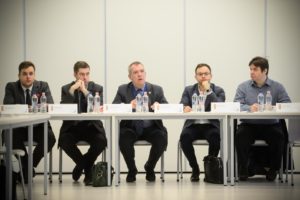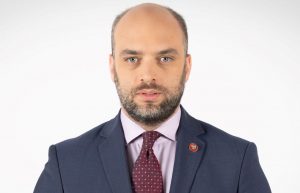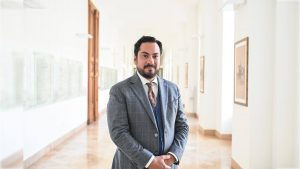Interview with Péter Tálas, Head of the NKE’s Strategic Defence Research Institute.
Most people today may know you primarily as a security policy expert, but you graduated as a historian. Did a childhood interest lead you to history or was it a passion that developed later?
I became interested in history in my last year of high school, but it was only during my two years of border guard service that I decided to apply to university in this specialisation. I also have Polish roots through my mother, and the early 1980s were very exciting years for Poland and Polish society. Solidarity movement, military coup – my relatives were up to their necks in it – so I knew I wanted to focus on the history of the post-WWII region of Central and Eastern Europe. The Polish theme has dominated my research and academic interests for almost ten years. I wrote my thesis on the circumstances of the Polish communists’ rise to power and my PhD dissertation on the evolution of the Polish party system after 1989. I started dealing specifically with security policy in the early 1990s, when my friend, tarot partner, former university professor, mentor, colleague and later boss, Ferenc Gazdag, invited me in 1994 to work at the predecessor of my current institution – the Strategic Defence Research Institute. For that matter, a small group of researchers in Hungary started to study this field only a few years earlier, so it was relatively new. I held onto this subject, the institution and the work that goes on here, because I found it an important and exciting area from the beginning.
You wrote about Poland exactly twenty years ago: “The 1989 waves of change simply swept away the traditional routes and tools of Polish-Hungarian cultural exchange”. How do you see it; does it look better today?
Unfortunately, I don’t have the time to follow this area with the interest I used to. I just feel that, while economic relations and tourism between the two countries are developing, and there are noteworthy initiatives in the framework of Visegrád cooperation; not to mention the Erasmus programme, for which we are also target countries, there are still not enough young Polish professionals that dealing with Hungary, or young Hungarian professionals dealing with Poland. Perhaps it is caused by the fact that, in recent years, both countries and both societies have become more preoccupied with themselves and with Europe. But it’s easily possible that it’s just that relations are now maintained at local (urban, institutional) levels, and I’m un able to observe them. Just like how I can’t see the Polish connections of young people who now have serious and regular cultural contact through social media. Just a minor example: one of my daughters is a graphic designer, and many young Polish artists were represented at the exhibitions where I saw her work. And seeing how often she shares pictures of her fellow Polish graphic designers on Messenger with me, I assume that this connection was not broken during the time of the coronavirus epidemic. In fact, it may be getting stronger.

What are the research topics you are now busy with instead of the Poles? Are they affected by the situation caused by the coronavirus?
Of course, like everyone else, my work is affected by the pandemic. We work from home and keep in daily contact with my colleagues digitally but, for a researcher, this is not so new or unusual. As for the topics, besides the security processes in Central and Eastern Europe, my main research areas are the new challenges, primarily terrorism and migration. But these are more like subjects, topics to explore the question of how we think about security. (A recent study on the subject, co-authored with Alex Etl from the Institute, compared the results of three representative opinion polls. Its main findings can be accessed here and here. – the editor) I really love my job, reflecting together with my colleagues – whether during working hours or late at night. As they all know their fields very well, or, as I like to say, they are much smarter than me, we have fantastic debates, which I think is a great pleasure and inspiration for everyone involved.
How do you see own research field helping in Hungarian public thinking?
Since the staff of the Institute for Strategic Defence Studies, including me, are relatively well represented in the media as experts, and we write a lot, we certainly have an impact on public thinking. And, over the years, I have chosen my colleagues so that our approach to security, and therefore our message, is very similar. In essence, to understand what is happening to us and around us, we need to understand the underlying causes, drivers and processes.
What is the secret of your excellent relationship with the press? How did it start?
There’s no secret in this. I simply know what is expected of me as an expert, because, in addition to my research work, I’ve worked as an editor for a weekly newspaper, tried radio presenting and was a freelance editorial reporter for Hungarian Television for six years. So I know how difficult it is to be on the other side, and I try to take that into account to the largest possible extent. I always tell my young colleagues that the listener and the viewer want to understand things, not learn them, so try to keep it short, simple and clear; and that in an expert statement, the subject should always be the main character, not the interviewee or the reporter; that they should prepare before an interview and formulate or even write down (as I still do) what they want to say or write in a message about the issue at hand; and that they will often find themselves in situations where they can best preserve their credibility as an expert by saying “I don’t know”.
Earlier, speaking about the professionals of the foreign relations administration, you stressed that “those working in this field have a great responsibility, because the Hungarian state apparatus and the Hungarian state are judged abroad on the basis of their linguistic and professional qualifications and knowledge”. Can you see any progress on this issue?
In some places yes, in others not yet. We clearly made progress in terms of language skills, professional qualifications and knowledge of the world. However, as the current Hungarian foreign policy prefers a more confrontational policy of advocacy, it is much more difficult for young people working in the field of foreign relations administration to use and enforce the second line of foreign relations, while peer-to-peer relations have a great role in and responsibility for understanding Hungarian positions by ensuring smooth cooperation.
If you were starting your career, which field would you head?
I would probably deal the same issues now, but I would pay much more attention to the virtual world, to the impact of modern communication technologies and processes on our perception of security and their impact on our security. Of course, I try to follow this now, but unfortunately only as a digital immigrant. I am convinced that we face a great generational change, because the political takeover of the digital natives hasn’t happened yet. This will fundamentally change the way we think about the world and security in many areas. And I hope, as a consequence, the practice of security policy.
How can we imagine a post-digital natives world?
On the one hand, I’m convinced that digital natives will be better able to navigate the huge amount of information that has been thrown at them through the Internet, and especially through social media platforms. In other words, they will learn to distinguish the important from the less important, the virtual from the real,; they’ll be able to protect their individual and collective privacy from manipulation, but above all, they won’t see digital opportunities as something special or scary, but simply as a tool. As I see it, this learning will also be facilitated by the development of information technology, such as artificial intelligence (AI). On the other hand, I am also convinced that, with AI and the new technologies associated with it, the work of the new generation of researchers will also change fundamentally, for example in the fields of data processing and analysis, forecasting future processes and preparing decisions. In other words, we’ll have a clearer picture of the reality of the present, and perhaps also of the possibilities for the future.
What do you like most about being a researcher?
What I like most is the thrill of the intellectual challenge; the discovery and the path to get there brings me a lot of joy. For a researcher like me, the most important task is to read, to orientate, to understand, to explore and to communicate. I am also very close to research teamwork, writing a joint book, study or analysis, or filling a conference or summer school with professional content. And of course, it’s also great that I can do some of my work anywhere and anytime, because thinking about a problem while washing the dishes, driving or cycling is also great.
Névjegy
Péter Tálas
Age: 61 years old
Qualifications: historian, security policy expert, PhD in political sciences
Research areas: Security in Central and Eastern Europe, new types of security challenges, media and security
Publications: MTMT
Marital status: married, father of two
Hobbies: tarot, board games



